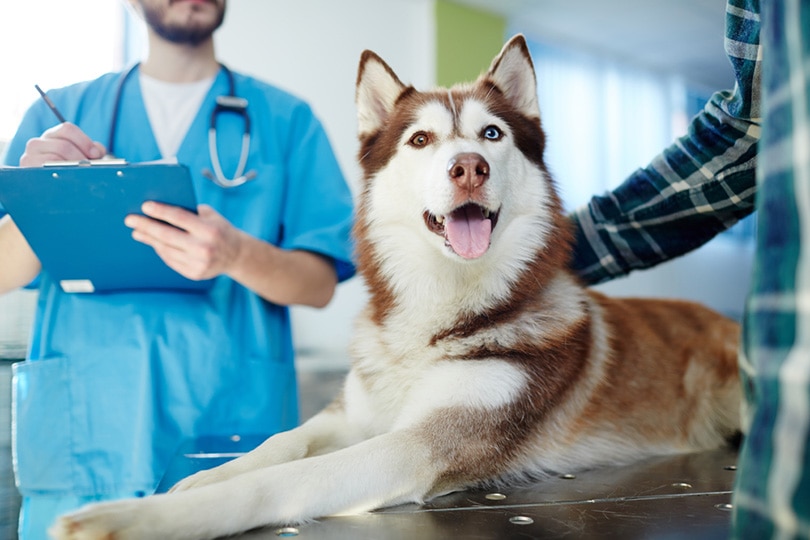Pancreatitis is one illness you want to take seriously, as mismanaging this disease can quickly become fatal. Pancreatitis is the inflammation of the pancreas, the part of your dog’s body that creates hormones such as insulin and digestive enzymes. The pancreas is vital for several important bodily functions including glucose control.
If your dog has pancreatitis, you will have to change how you feed them. You’ll need to switch them onto foods that are easier to digest and more suited to dogs with pancreatitis. While this change may be temporary, consider changing your dog to a pancreas-friendly diet full-time because you don’t want to stress the pancreas more and pancreatitis can be recurrent. Veterinarians recommend that dogs with pancreatitis eat a diet that is low-fat and highly digestible. You should follow your veterinarian’s instructions on feeding. In principle, egg whites are an excellent protein source, but the yolks need to be removed for dogs with pancreatitis.
What Should Dogs with Pancreatitis Eat?
As we’ve mentioned, dogs with pancreatitis will need to be fed a diet that is low in fats and highly digestible. Low-fat dog food can promote pancreatic healing and help prevent your dog from having future problems with chronic pancreatitis. There are several prescription diets that your vet may recommend.
Low-fat dog foods for dogs with pancreatic problems offer all the nutrition your dog needs daily without the excess fat that is implicated in pancreatic flare-ups. If your dog has a history of pancreatitis, your vet may recommend that you feed your dog low-fat food to prevent flare-ups.
Dogs with pancreatitis can eat eggs so long as the eggs are not cooked with butter, oils, or whole milk. Eggs yolks can be challenging for the body to digest when it has pancreatitis as they’re high in fats. So, if your dog has pancreatitis, you’ll want to skip the egg yolks and feed them egg whites. However, all foods fed should be discussed with your vet first.

Signs of Pancreatitis in Dogs: What Is Pancreatitis?
One of the pancreas’ many functions is the production of digestive enzymes. Ideally, these enzymes are inactive until they’re secreted into the intestinal tract to break down a recent meal. Pancreatitis occurs when the digestive enzymes become active prematurely while still inside the pancreas. This causes pancreatic inflammation and sometimes infection or tissue death.
Pancreatitis can be mild or severe; it can develop over a long period or suddenly appear, you may have it once, or it can be a chronic problem. Signs in dogs with pancreatitis can vary wildly from each other because the illness has a spectrum of severities and symptom profiles.
- Lethargy
- Abdominal pain
- Poor appetite
- Vomiting
- Diarrhea
- Prayer position
- Abdominal enlargement
- Fever
However, these signs are not specific to pancreatitis in dogs. They may be present in any number of other illnesses seen in dogs. To make a diagnosis, your vet will have to run tests. These may include blood chemistry panel, pancreatic enzymes, complete blood cell count, urinalysis, and maybe even abdominal ultrasound.
Even if this initial panel points to pancreatitis, your dog may still need additional testing, to reach a solid diagnosis of pancreatitis.
What Treatment Options Are There for Dogs with Pancreatitis?
Treatment for pancreatitis will depend mainly on the dog’s symptoms. Any abnormalities detected during the blood work and urinalysis will also be significant factors in the type of treatment your dog needs. The goal of treatment is to keep the afflicted comfortable and support their physical needs while giving the pancreas time to heal.
Fluid therapy and medications to control nausea and pain are usually necessary for your dog’s quality of life. If your dog has an infection in the pancreas, your vet will prescribe antibiotics to treat or prevent the disease.
Dogs with severe symptoms will need to be hospitalized so your veterinarian can provide more aggressive treatment. Research shows that dogs with pancreatitis who return to eating dog food have an improved prognosis. Thus, veterinarians aggressively use anti-nausea drugs to treat vomiting to keep dogs with pancreatitis fed.

In Summary
It can be scary when your dog starts showing signs of pancreatitis. Luckily, many dogs that come down with it live whole and happy lives with adjustments to their diet and medication routines. You and your vet can help your dog live a good life regardless of his special dietary needs!
We want to emphasize that pancreatitis is a severe illness, and if you suspect your dog has it, you should take them to the vet immediately. Dogs that receive medical treatment early into the disease have much better prognosis than those whose treatment was delayed.
Featured Image Credit: Rasa Kasparaviciene, Unsplash










